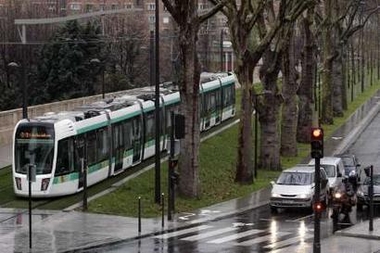
from the Transport Politic blog:
When it comes to transportation economists, theres pretty much one answer to every problem: Equate pricing of all modes with their greater societal impacts. In general, this means that we (in the U.S.) ought to be charging drivers more to make up for the negative effects they have on the environment and the roadway infrastructure, and that we ought to be increasing subsidies to encourage people to take transit.
This approach could be implemented in a variety of ways depending on location, but one model that has been particularly appealing to planners interested in reducing the perceived negative economic and social effects of traffic has been that of London, which in 2003 implemented a congestion charge on drivers entering its central business district. Revenues from the program went to increasing transit service. The method, unsurprisingly, has been a major success in terms of reducing traffic: Between 2002 and 2007, overall car movements in the district decreased by 39%. Meanwhile, travel on public transportation increased correspondingly over the same time period: By 24% on commuter railways, 16% on the Underground, and 18% on buses.
These are excellent results and the effects have been overwhelmingly positive for commuters and residents of Londons central areas.
But what if congestion charging is just too much of a hot topic for even progressive American cities to handle? The effort to instate a similar system in New York City in 2008 was so thoroughly brought to its feet that it is hard to imagine wanting to repeat the fight.
Yet theres an alternative, and it may prove just as productive if the goal is to reduce traffic: Paris systematic engagement to make it harder to drive in the city. The French capital has proceeded in a manner far different from that of London, choosing to avoid paid penalties on drivers in order to prevent the further development of the already-existing sense that the City of Paris is attempting to isolate itself from its suburbs, which are already cut off by a ring road. 40% of drivers within the citys borders are inhabitants of the surrounding areas.
As a result, the administration of Mayor Bertrand Delanoë has since 2001 prioritized the creation of bicycle, bus, and tramway infrastructure along with the reduction of vehicle lanes along both major boulevards and side streets. Huge sections of the city have been designated 30 km/h zones and biking is now allowed in both directions on most streets, even those that are one-way for automobiles. Free parking has been mostly eliminated. This spring, the city reinforced its efforts to commit far more street space to biking and expand that modes travel share. ..............(more)
The complete piece is at:
http://www.thetransportpolitic.com/2010/10/06/an-alternative-to-congestion-pricing-roadway-traffic-restraint/